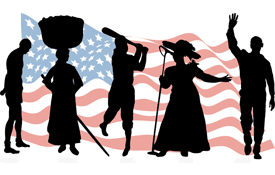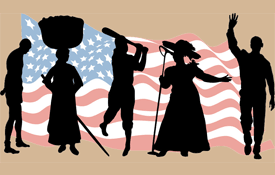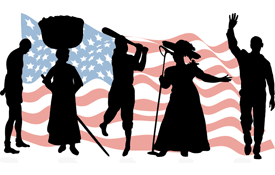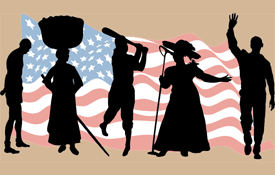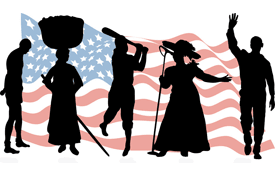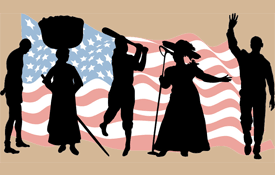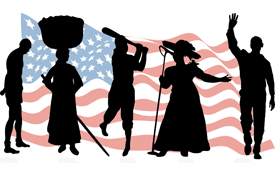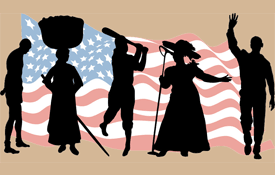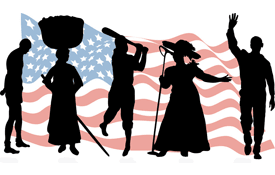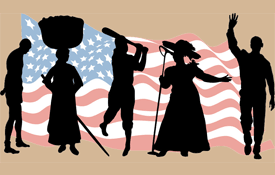Categories
-
- History
- by Hugh Smith
- 04/25/2007
The television producers of African American Lives 2 are seeking an African American to join Harvard professor Henry Louis Gates Jr. and an all-new group of distinguished African Americans tentatively scheduled to air on PBS in February, 2008. Under the supervision of Professor Gates, the series' research will be conducted by genealogists Tony Burroughs, Johni Cerny, Jane Ailes and Megan Smolenyak together with Ancestry.com, one of the world's leading online resources for family history information. The selected individual's family history will be researched and featured on African American Lives 2, while a DNA testing service will provide a genetic analysis. If you are interested, apply online at pbs.org/aalives. Online applications must be received by 6:00 p.m Eastern, Friday, May 4, 2007.
-
0 Paul Robeson: Portraits of the Artist
- Civil Rights
- by Hugh Smith
- 04/18/2007
In an age of specialization, Paul Robeson was known as a true "Renaissance Man." He spoke or read over 20 languages, including Russian and Chinese. Robeson may have been the most internationally famous African American in the 1930's. He carved out a lasting legacy as a world class artist, activist, singer, actor, lawyer, and athlete. A Phi Beta Kappa Rutgers University graduate and a Columbia Law School graduate, Robeson was the first African American "All American." He shifted his focus from the arts to social causes in the mid 1930's when he became involved in the labor movement. A 1934 visit to the Soviet Union was the first of his many international trips. Paul Robeson was denied a passport by the U.S. Government between 1950 - 1958 because of his growing outspoken sympathetic views towards communism. Mr. Robeson was an extraordinary talent and humanist. Robeson's legendary performances include roles as Shakespeare's Othello, and Eugene O'Neill's Emperor Jones. He also left a lasting impression in the stage version of Porgy and Bess. In Hollywood, he starred in Showboat, and King Solomon's Mines. There's a new 2007 DVD box set, Paul Robeson: Portraits of the Artist, featuring highlights of his amazing film career. The box set also contains an incredible compilation of all things Robeson, including the audio of a 1958 radio interview he granted to Pacifica. Paul Robeson: Portraits of the Artist is an outstanding DVD box set appropriate for an intimate introduction to a man who is a unique personality among black history people.
-
0 Classic Soul Tribute to Jackie Robinson
- History
- by Hugh Smith
- 04/14/2007
April 15, 2007, is the 60th anniversary of Jackie Robinson's first baseball game in the major leagues. Catch my perspective in Jackie Robinson Honored with 13 Song Tribute. I wrote this piece exclusively for the classic soul/R&B section of the new website, TBD.com. 2018 update: Unfortunately, the original TBD.com website has shut down, and I don't have a copy of the original review.
-
0 100 Screen Icons of Black History
- Film
- by Hugh Smith
- 04/11/2007
100 Black Screen Icons is a new website that spotlights 100 of the most significant black personalities in film and television. You can vote on your favorites in four different categories through June 29, 2007. The new site is sponsored by the United Kingdom Film Council and the BBC. Personalities in the poll are not just the usual suspects... Denzel Washington Halle Berry Ousmane Sembene Oscar Michieux (British actors) Ashley Walters, Sophie Okenodo, Marianne Jean-Baptiste and Adrian Lester Amanda Nevill, Director of BFI, a co-sponsor of the site, says: “We believe the 100 Black Screen Icons website will not only promote the cultural and creative importance of black professionals in film and television, but will also inspire young people globally in the future to pursue a career in film and television." "It is our hope that the website will become a definitive guide to black film, as well as an educational learning resource and entertaining medium which can reach a huge range of audiences all over the world." The nominations have been compiled with the help of experts including directors, actors, writers and technical innovators. Nominees come from the U.K., Europe, North America, Africa and the Caribbean. 2018 Update: we removed the link to the site as it may no longer be in operation.
-
0 Black History Tuskegee Airmen Honored with Congressional Gold
- News
- by Hugh Smith
- 04/04/2007
The Tuskegee Airmen received the Congressional Gold Medal from President George W. Bush on March 29, 2007. The Congressional Gold Medal is the highest civilian honor given by the U.S. Congress. Tuskegee airman Dr. Roscoe Brown, a former commander of the 100th Fighter Squadron, 332nd Fighter Group, thanked President Bush, the House, and the Senate for "voting unanimously to award this medal collectively to the pilots, bombardiers, the navigators, the mechanics, the ground officers, the enlisted men and women who served with the Tuskegee Airmen." Retired Lt. Col. Alexander Jefferson, a pilot with the 332nd Fighter Group also addressed the crowd gathered at the U.S. Capitol. The Tuskegee Airmen were an elite group of African American pilots in the 1940s. They were black history pioneers in equality and integration of the U.S. Armed Forces. According to U.S. Army Airman Brian Butkus, 375th Airlift Wing, "Tuskegee Airmen" refers to anyone involved in the Army Air Corps program to train African Americans to fly and maintain combat aircraft. Butkus confirms that The Tuskegee Airmen included: Pilots Navigators Bombardiers Maintenance and support staff Instructors All personnel who kept the planes in the air. Most service-member flight training took place at the Division of Aeronautics of Tuskegee Institute. Air Corps officials built a separate facility at Tuskegee Army Air Field to train the pilots. The Tuskegee Airmen not only battled enemies during wartime but also fought against racism and segregation. Racism was common during World War II. Many people did not want blacks to become pilots. By the end of World War II, 992 men had graduated from pilot training at Tuskegee; 450 were sent overseas for combat assignment, and about 150 lost their lives while in training or on combat flights. On November 6, 1998, President Bill Clinton approved Public Law 105-355, which established the Tuskegee Airmen National Historic Site at Moton Field in Tuskegee, Alabama, to commemorate and interpret the heroic actions of the Tuskegee Airmen during World War II. * special thanks to the U.S. Army for providing some of the official background information.
-
0 Muhammad Ali Lands Living Legend Honor from Africa
- News
- by Hugh Smith
- 03/28/2007
Muhammad Ali has been honored as a "Living Legend" by the Economic Community of West African States (ECOWAS), and the Ghanaian based African Communications Agency (ACA). "The Greatest" is a 2007 inductee into the ECOWAS Hall of Fame. Ali's African connection dates back to 1974, when he faced George Foreman in Kinshasa, Zaire for the "Rumble in the Jungle." Mr. Ali accepted his award by telephone from the United States during an elegant awards banquet held at the Nicon Hilton Hotel in Abuja, Nigeria. Dr. Erieka Bennett, Vice Chairman of the ACA and founder of the Diaspora African Forum proclaimed "we are honored to celebrate the life of Muhammad Ali." Accepting the award, a grateful Ali declared "this tribute is especially meaningful to me as we celebrate Black History Month here in America." Past ECOWAS Living Legend Award recipients include: Nelson Mandela (former South African President) Kofi Anan (former United Nations Secretary General) Dudley Thompson (former Jamaican Ambassador to Nigeria) Ruth Sando Perry, (former President of Liberia) Professor Wole Soyinka, (Nigeria) Dr. Babacar Ndiaye (former President, African Development Bank) Dr Bamanga Tukur (former Nigerian Minister of Industry) Muhammad Ali, born Cassius Clay on January 17, 1942, won an Olympic gold medal in Rome as a light heavy weight in 1960. He defeated Sonny Liston in 1964 to win the heavy weight championship for the first time. Ali won the crown again in 1974 by beating George Foreman. "The Greatest" became the first person in boxing history to win the heavy weight title three times when he took out Leon Spinks in 1978. Ali refused to be drafted into the U.S. Army (he was a conscientious objector on religious and moral grounds). He was stripped of his first title in 1967. The official Muhammad Ali website has much more for you to enjoy!
-
0 Spike Lee Directs Cinema Forward at 50
- Film
- by Hugh Smith
- 03/21/2007
Shelton Jackson "Spike" Lee was born in Atlanta, Georgia, on March 20, 1957. Spike’s family moved to New York City in 1959 for employment opportunities for his jazz bassist father, Bill Lee. Spike Lee graduated from Morehouse College in 1979, then studied film at New York University. Lee’s 1983 student film, We Cut Heads, was screened at The Museum of Modern Art in New York City as part of the New Directors/New Films Festival. We Cut Heads was also broadcast on public television in 1983-1984. Spike's first successful commercial hit, She’s Gotta Have it, premiered at the San Francisco Film Festival in March, 1986. Lee’s vision is to make realistic movies for and about real African American people that stimulate, provoke, and entertain. His success in films School Daze, Jungle Fever, and Do the Right Thing, have paved the way for other contemporary African American directors, including: Mario Van Peebles - New Jack City, John Singleton - Boyz N the Hood, Matty Rich - Straight out of Brooklyn, and (Lee cinematographer) Ernest Dickerson - Juice. When the Levees Broke, Lee's acclaimed 2006 documentary about Hurricane Katrina, was featured on both HBO and public television. Spike Lee's entire filmography is available at imdb.com.
-
0 Walker, Washington, and Winfrey Capture Women's History Success
- History
- by Hugh Smith
- 03/14/2007
March, Women's History Month, is a great time to look at three African American ladies who identified specific community needs, created some valuable services, and then prospered financially from their cutting edge innovation. Madame C.J. Walker, (1867-1919), was one of the first American women to become a millionaire. Walker was also the first African American female millionaire. She created an original formula for straightening hair. Her hair ointment became an overwhelming overnight success. With just $2, the Madame C.J. Walker Manufacturing Company was born in Indianapolis, Indiana (1910). At its zenith, the Walker business empire directly employed 5,000 black women in schools, salons, laboratories, and factories. Madame Sara S. Washington, (1881-1953), was also a pioneering African American entrepreneur. She too became a millionaire by providing cosmetic and beauty products targeted toward black women. The Buckley, Virginia native launched her first beauty shop in Philadelphia, Pennsylvania. In 1920, Washington manufactured hair care and beauty preparations under the name of Apex Hair Products. She also founded various Apex Beauty Colleges. Oprah Winfrey's gateway to success: mass media, communications, and entertainment. Oprah was Nashville, Tennessee's first African American television correspondent in 1973. By 1978, she was co-hosting a local talk show in Baltimore, Maryland. After a year in the Windy City hosting A.M Chicago on WLS-TV, the program was renamed The Oprah Winfrey Show in 1985. In 1988, she launched Harpo Productions, the creative center of her many entrepreneurial activities. In the black history timeline... Madame C.J. Walker Madame Sara S. Washington Oprah Winfrey are three creative African American women who have personally reaped big financial benefits because of their direct and indirect involvement in doing something positive for their communities.
-
0 How New Museums are Preserving Black Culture
- News
- by Hugh Smith
- 03/07/2007
Museums that focus on the critical role of African Americans in U.S. history and culture are more popular than ever, and several cities are planning new or expanded facilities to attract tourists and scholars. Birmingham, Alabama has a civil rights district that includes the Sixteenth Street Baptist Church, the site of a 1963 bombing that killed four young girls. Another exhibit features the door to the jail cell where Martin Luther King Jr. sat in 1963 and wrote his “Letter from a Birmingham Jail.” There are approximately 200 U.S. museums that focus on the African American experience. Several new projects are on the drawing board. Here are a few: A museum in Atlanta to exhibit the papers of Martin Luther King Jr. United States National Slavery Museum in Fredericksburg, Virginia National Museum of African American History and Culture in Washington, DC. The old F.W. Woolworth store in Greensboro, North Carolina, is being converted into a museum that will display the “whites only” lunch counter where, in 1960, four black college students launched the sit-in movement to protest segregation. One of the newest museums is the National Underground Railroad Freedom Center in Cincinnati, which opened in 2004. It tells the stories of the estimated 100,000 slaves who escaped via the “underground railroad,” a loose network of clandestine routes and safe havens provided by abolitionists, freed slaves and other sympathizers. Not all African American museums focus primarily on slavery or civil rights. Museums in Dallas and New Orleans, among others, are dedicated to African American art and culture. Kansas City, Missouri, has the American Jazz Museum. There’s the National Afro-American Museum and Cultural Center in Wilberforce, Ohio, which created an exhibit that traced African dance over 400 years. In New York, the Museum for African Art is being expanded and moved to a new home where it will be “a cultural gateway to Harlem,” according to Mayor Michael Bloomberg. The new museum in Washington, DC, which will take several years to develop, is going to cover the breadth of experience from African origins down to the present. These museums are not just aimed at an African American audience, they are for everyone. They create the opportunity to really understand the history of black people in the USA. Louise Fenner contributed to the research and wrote portions of this article. Check out the Association of African American Museums for more details and links to black museums across the USA.
-
0 MLK DC Memorial Fund gets closer to Goal
- News
- by Hugh Smith
- 03/02/2007
February 2007 was the best fundraising month yet for the Martin Luther King Jr. Washington, DC National Memorial. Harry Johnson, President and Chief Executive of the memorial's foundation is asking everyone, including school kids, to get involved in the effort to raise the $100 million dollars needed to build and maintain the memorial on the national mall. On February 27th, the National Association of Realtors announced a $1 million donation, bringing the total value of gifts raised from all sources to $78 million dollars. Last week, I donated copies of the Empower Encyclopedia Salute to Black History DVD to a silent auction, sponsored by a major media organization, with all proceeds going to the King Memorial fund. The Martin Luther King Jr. Memorial is scheduled to open in 2008, facing the Jefferson Memorial, on the banks of the Tidal Basin.
